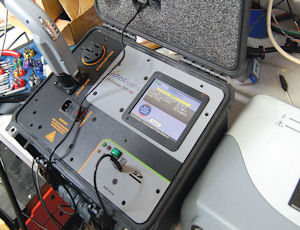Gridtest Systems Inc., a startup that develops test equipment for electric vehicle chargers, recently moved to Westlake Village from an incubator space near downtown Los Angeles. The company received $335,000 from the investment groups Pasadena Angels and Tech Coast Angels, and several other private investors, which enabled the move last month. Its equipment tests the connections between electric vehicles and charging stations. “As we get charging stations around the world it really is important that people can rely on them when they pull up and plug into them,” said Neal Roche, Gridtest’s co-founder and CEO. Until April, Gridtest was one of seven clean or alternative energy businesses at the Los Angeles CleanTech Incubator, which opened in October 2011. The company’s ability to move after just six months is a sign of success even at this early stage, said Fred Walti, the incubator’s executive director. “They could dominate their niche,” Walti said. “When you can contain margins it makes it more difficult for others to enter.” Roche and business partner Tom Schurman started Gridtest in November 2010 and have invested about $680,000 into the company, including the $335,000 from investors. The Gridtest facility in Westlake Village is for research and development of the test equipment and the company contracts with We Imagine Inc., a printed circuit board manufacturer in Chatsworth, to make the equipment. The company’s first shipments of its testers went to the U.S., Europe, Asia and Australia. Roche said he established valuable relationships through the Los Angeles Venture Association, the CleanTech Incubator, and other entrepreneurial professionals, which enabled him to attract funding resources to build the business. In fact, Roche said he already knew members of the Pasadena Angels and Tech Coast Angels when he made the pitch for funding in December. “To have someone who can vouch for the founders is valuable,” said Steve Sereboff, an intellectual property attorney in Westlake Village and a member of the Tech Coast Angels. He facilitated the introduction of Roche to the group. Ian McGregor, a member of the Pasadena Angels who serves on the Gridtest board of directors, said the investment group was intrigued that Roche and Schurman had identified a niche market and developed portable equipment to sell into it. The Gridtest tester emulates an electric vehicle and comes in models for the lab, where charging stations are developed, and out in the field where they are used. “You cannot get a car up to a lab to test the charging stations,” McGregor said. Gridtest is entering a growing market. Hybrid vehicles that combine a standard combustion engine and a battery have been available in the U.S. for a number of years, though they started to become more visible in the market in December 2010 with the Chevrolet Volt and the Nissan Leaf. In California, hybrid vehicles made up 4.3 percent of new car sales in 2011, according to the California New Car Dealers Association. Nationally, hybrid sales were 2.1 percent in 2011. Gridtest’s business model aims to address a need for quality control as more charger stations crop up to support the cars, Roche said. General Electric, ECOtality, and AeroVironment Inc., in Monrovia, manufacture charging stations. Utilities, including Southern California Edison, are doing research to integrate the chargers into smart grid systems, Roche said. “We are investing in smart energy networks,” he said. The goal for Roche and Schurman is to build Gridtest into a leader in the electric vehicle infrastructure market and set the standards for test equipment. Achieving that goal means building an engineering team that can constantly innovate and come up with new products, Roche said. Some of the engineering team had worked with Roche and Schurman at Ixia, the Calabasas-based provider of test services for IP networks. The investors into Gridtest will have other goals in mind, but Roche has that covered, as well. “We tell them this company is an attractive acquisition target and they have an exit,” Roche said.
